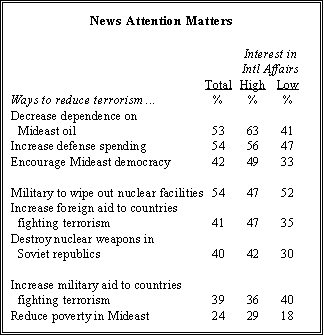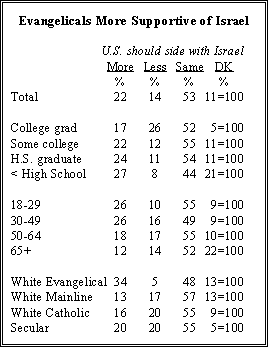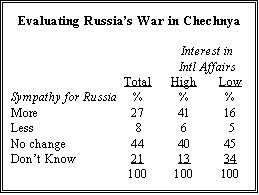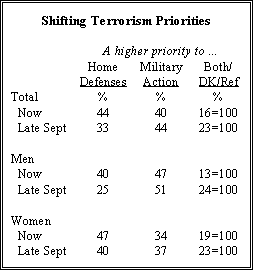Many Reasons Justify Iraq Action

Americans see several possible justifications for expanding the war into Iraq. Fully 83% say evidence that Iraq abetted the Sept. 11 attacks would be a very important reason for using force. Nearly as many say force is justified if Iraq is developing weapons of mass destruction (77%) or is harboring other terrorists (75%).
However, the idea of taking military action against Iraq meets with some resistance, especially when American casualties are mentioned. Support for the use of force falls from 73% to 56% when the prospect of major U.S. casualties is raised, while opposition nearly doubles (from 16% to 31%). The threat of losses to American troops is of particular concern to women and Democrats, no more than half of whom would support military action in Iraq if it might mean thousands of casualties.

Within at least two other important constituencies – minorities and the elderly – there also is significant concern about expanding the war into Iraq. While a majority of non-whites (57%) favor military action to end Saddam Hussein’s rule in Iraq, that proportion falls to 38% when the threat of casualties is mentioned. Fewer than half of those age 65 and over (48%) would favor military action if it might mean U.S. forces would suffer major casualties, compared with 58% of those under age 65.
Most Prefer Force to Diplomacy
Americans appear to have little faith in the effectiveness of diplomacy when it comes to dealing with Saddam Hussein. Given the choice of offering to remove economic sanctions against Iraq or threatening military attacks as a means of renewing weapons inspections in Iraq, just a third favor the softer option, with nearly half (49%) choosing force. Of those who would offer to roll back sanctions, the vast majority (67%) say that if Saddam still resisted weapons inspections, military force would be justified.
Not surprisingly, support for diplomacy comes from some of the groups expressing reservations about using force. Fully half of African-American respondents favor at least trying to come to a negotiated agreement before resorting to force, while majorities of whites and Hispanics favor using military pressure. A plurality of liberals (46%) prefer a diplomatic approach, while conservatives, by more than two-to-one (57%-26%) think the threat of military attack is a better approach to dealing with Iraq.
While younger Americans are more likely than retirees to say they would favor military strikes in Iraq, they also are more open to at least trying diplomacy first. Four-in-ten (41%) 18-29 year-olds think the U.S. should offer to remove economic sanctions as an inducement to Saddam. Just 22% of those who are age 65 and older favor offering to remove economic sanctions.
But Allied Support Is Crucial
The public’s support for military action against Iraq comes with a condition: of those willing to threaten military attack in order to force Saddam Hussein to accept weapons inspections in Iraq, 53% say we should attack only if our major allies agree to join us, while 41% are willing to go it alone.
This view is held particularly strongly by older Americans. By more than two-to-one (62%-30%) Americans age 65 and older who say force is an option feel we should follow through only with allied support. Those under age 29 are divided on whether allied support is necessary (49%-49%).
Beyond Baghdad
The public favors taking the anti-terrorism military campaign well beyond Iraq. Strong majorities say they would favor using military force to destroy terrorist groups in Sudan (73%) and Somalia (65%). As with the use of force in Iraq, women and Democrats are somewhat less supportive of military action in all of these cases. Similarly, more than two-thirds (69%) favor providing military aid to help the Philippines and Indonesia fight terrorist organizations in their countries. The struggle against terrorism also has made Americans less reluctant to station peacekeepers in dangerous situations: fully 68% think the U.S. should keep military forces in Afghanistan as a means of maintaining civil order after the bombing has stopped. That is far more than the percentages that favored the deployment of peacekeepers in Kosovo (54%) or Bosnia (58%) in the late 1990s.
Majority Backs Cutting Oil Dependence

The public is divided over the best ways to reduce future terrorism against the United States. A 54% majority favors increasing defense spending to bolster U.S. military forces, while the same number says it is very important to take military action against countries that seek to develop nuclear weapons . But there is as much support for a dramatically different approach – 53% give high priority to decreasing this country’s dependence on Middle East oil.
Other possible strategies aimed at reducing the terrorist threat win less public backing. Roughly four-in-ten (42%) think it is very important to encourage democracy in the Middle East. About as many give high priority to providing military and other assistance to anti-terror allies, and to buying up and destroying nuclear weapons in the former Soviet Union. Only about a quarter of the public (24%) believes that providing aid to alleviate poverty in the Middle East is a very important means of reducing terrorism.
Americans who are closely following international affairs express somewhat different views about what would be effective in reducing terrorism than do those who are paying little attention. Among those who are engaged by international affairs, 63% say it is very important to decrease U.S. dependence on Middle East oil; just 41% of those less interested and not as well informed about international affairs agree. While approximately the same proportion in each group place high priority on providing military aid to allies in the war against terrorism, they diverge on the question of foreign aid. Three-in-ten (29%) of those interested in foreign affairs say it is very important to try to combat terrorism by alleviating poverty in poor countries in the Middle East; just 18% of those who are not as engaged by international affairs agree. Republicans and Democrats are in broad agreement over most anti-terror approaches, but they differ sharply over military spending and foreign aid. Two-thirds of Republicans rate increased defense spending as a top priority, compared with 51% of Democrats. More Democrats than Republicans say it is very important to provide foreign aid to alleviate poverty in the Middle East (30%-18%).
Modest Rise in Support for Israel

As in the past, a majority of the public (53%) believes that the United States should maintain its present level of support for Israel. But thosewho think the U.S. should side more with Israel outnumber those who would like to see the U.S. weaken its ties to Israel, 22%-14%. As recently as mid-October, this disparity did not exist (16% preferred stronger ties, 19% wanted the U.S. to side less with Israel).
The shift toward a pro-Israel stance has been most notable among younger, less-educated citizens. Among Americans with a high school degree or less, those who favor closer relations with Israel outnumber those who want to side less with Israel by more than two-to-one (25%-10%). But 26% of college graduates say the United States should reduce support for Israel, while just 17% want the U.S. to side more with Israel. Similarly, 26% of Americans under age 50 think the U.S. should side with Israel more, compared with 18% of those age 50 to 64 and just 12% of those age 65 and older.
The religious divide on this issue is more striking. Roughly a third (34%) of white evangelical Protestants express the desire for stronger support for Israel, while just 5% think the U.S. should move in the other direction. Opinion among white mainline Protestants, white Catholics and the non-religious are divided.
Changing Sympathies?

Only about one-in-four Americans (27%) have more sympathy for Russia in its struggle with Islamic rebels in Chechnya these days. A 44% plurality feels no differently about the conflict and just 8% say they are less sympathetic to our newfound allies.
As many as 41% of Americans who have above-average knowledge of and interest in international affairs have become more sympathetic to Russia in its conflict with the Chechen rebels, compared with one-in-five expressing that view among the disengaged segment of the public.
Among the public overall, opinion regarding China’s efforts to combat Islamic rebels along its western borders is largely unchanged (51%) or uncertain (22%), with only smaller minorities feeling more (15%) or less (12%) sympathy for China. Even those who are the most engaged by world news do not have strong opinions on this issue.
More Concern Over Civil Liberties
Four months after the terrorist attacks on New York City and Washington D.C., Americans remain firm in their belief that the war on terrorism will require citizens to sacrifice some of their freedoms. Moreover, there continues to be strong support for the use of military tribunals for cases involving terrorist suspects who are not U.S. citizens. Still, a growing number express at least some concern that anti-terrorism efforts by the government might go too far.
A 55% majority of Americans think it will be necessary for the average person to give up some civil liberties in order to curb terrorism in this country, while 39% believe this will not be necessary. This is virtually identical to opinion measured in the week following the Sept. 11 attacks. In general, more educated, higher income, and middle-aged (30-64 year old) people are the most likely to believe sacrifices will be necessary. Politically, majorities of Republicans (60%), Democrats (53%) and independents (54%) think people will have to give up some civil liberties in the interest of public safety.
Racial Divide on Tribunals

An even larger proportion (65%) approve of the Bush administration’s plan to put non-U.S. citizens charged with terrorism on trial in special military tribunals rather than in the regular criminal court system, a measure also virtually unchanged from a Newsweek poll taken in late November. But there is a distinct racial divide on this issue, with whites favoring this approach by more than three-to-one (68%-19%) while blacks are divided (48% approve, 42% disapprove).
There is little disagreement between Republicans and Democrats over the need to sacrifice some civil liberties to achieve public safety, yet there is a substantial partisan gap in the level of support for the use of military tribunals. Fully 82% of conservative Republicans and 75% of moderate-to-liberal Republicans favor the use of tribunals for non-citizens accused of terrorism. By comparison, less than half of liberal Democrats (47%), and only slightly more conservative-to-moderate Democrats (55%) concur.
Overall, three-in-ten Democrats disapprove of the tribunals, compared with just 12% of Republicans. Political independents fall between the two groups of partisans, though 26% of independents also disapprove of bypassing the regular criminal court system.
Interestingly, while there is no gender gap over the perceived need for Americans to sacrifice some of their civil liberties, there is a strong divide over the use of military tribunals. Majorities of men (55%) and women (56%) agree that it will be necessary for the average person to give up some freedoms in order to curb terrorism in this country. But men are significantly more likely to approve of the use of military tribunals for non-citizens than are women (72%-58%).
More Worry About Government Excesses

Despite the continuing sense that sacrificing some freedoms will be necessary in the war on terrorism, there is growing concern that the government may go too far in its efforts. When asked whether they are more concerned that the government will fail to enact sufficiently strong anti-terrorism laws, or whether they are more concerned that new laws might excessively restrict civil liberties, 45% say the latter, up from just 34% in mid-September.
Highly educated Americans, in particular, are becoming increasingly anxious over the government’s anti-terror tactics. In the immediate wake of the attacks, those who had at least some college education were significantly less concerned about excessive government action, and more concerned about the government not doing enough, compared with people who never attended college. Today, the college educated are at least as concerned as those with less education about undue restrictions on civil liberties. And as with other aspects of the civil liberties issue, there are significant and growing racial divisions. By three-to-one (65%-22%), blacks are more concerned about excessive government action than about the government not doing enough. Whites, though, are split (41% worry about excessive laws, 43% worry the government will not do enough). And while men are more supportive than women of military tribunals for non-citizens, they also are more concerned than women about the government excessively limiting citizens’ freedoms.
Mixed Grades for Anti-Terror Efforts
The public remains largely approving of the government’s anti-terror efforts, but Americans continue to be more upbeat about the military campaign abroad than about progress in building defenses at home.
Overall, nearly nine-in-ten (89%) say the military campaign is going well, although fewer than four-in-ten (38%) say it is going very well. That marks an improvement in the public’s assessment of the war effort since early November, when 75% offered a favorable view (30% said it was going very well, 45% fairly well).
A majority of Americans also give a positive rating of progress in building defenses against terrorism in this country (13% excellent, 47% good). But more people have reservations about this aspect of the anti-terror effort – 37% rate it as fair or poor, compared with just 9% who see the overseas military campaign as not going well. The number holding negative opinions of the homeland defense effort has inched up since mid-October, when 26% rated the government’s performance as fair or poor.
Home Defenses Gain Priority

Concern that the nation could be hit with another round of terrorist attacks, which declined throughout the fall, is on the rise again. More than six-in-ten Americans (62%) say they are very or somewhat worried by the prospect of new attacks, up from 52% who expressed such concerns in December. The proportion saying they are very worried rose from 13% to 20%.
Accordingly, the public, by 44%-40%, now rates building anti-terror defenses at home as a higher priority than taking military action to destroy terrorist networks overseas. Opinion on this issue shifted gradually during the fall, with this marking the first time in a Pew Center survey that even a slight plurality has given homeland defense top priority. In late September, men backed foreign military action against terrorists by two-to-one (51%-25%), but that gap has narrowed considerably. In the current survey, 47% of men rate foreign military action as the higher priority, while 40% view homeland defense as more important. Women, who were divided in their priorities four months ago, now are much more likely to see building homeland defenses as the more important objective.
Despite the public’s renewed concern that the nation could be targeted with new attacks, Americans’ personal worries about terrorism, which declined in November, remains relatively low. Fewer than four-in-ten (38%) say they are very or somewhat worried that they or their families could become victims of terrorism, which is largely unchanged from early November (40%) but down from 50% in October.




